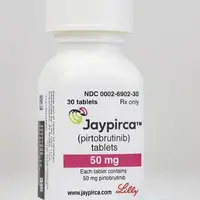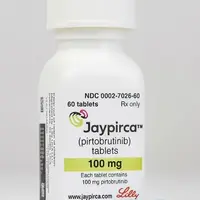Generic name: pirtobrutinib
Drug class: BTK inhibitors
Dosage form: tablets
Availability: Prescription only
Pregnancy & Lactation: Risk data available
Brand names: Pirtobrutinib
What is Jaypirca?
Jaypirca is a prescription medicine used to treat adults with mantle cell lymphoma (MCL).
Jaypirca belongs to the class of drugs called Bruton's tyrosine kinase (BTK) inhibitors. BTK is a molecular target found across numerous B-cell leukemias and lymphomas including mantle cell lymphoma.
Jaypirca works by binding to BTK to inhibit the activity of BTK kinase. This blocks the activity that leads to growth of the B-cells and causes cell death of the malignant B-cells.
Jaypirca is the first FDA-approved non-covalent (reversible) BTK inhibitor. It can reestablish BTK inhibition in MCL patients previously treated with a covalent BTK inhibitor (ibrutinib, acalabrutinib, or zanubrutinib) and extend the benefit of targeting the BTK pathway.
What is Jaypirca used to treat?
Jaypirca is used to treat adults with mantle cell lymphoma (MCL) that has come back (relapsed) or did not respond to previous treatment (refractory), and who have already received two or more treatments for their cancer, including a covalent Bruton tyrosine kinase (BTK) inhibitor medicine.
MCL is a rare blood cancer and a form of non-Hodgkin lymphoma (NHL). It arises in B lymphocytes, a type of white blood cell and part of the immune system. MCL frequently begins in B cells located in the mantle zone of the outer edge of lymph nodes. As the cancer progresses, it can spread to bone marrow, the spleen, the liver, or the digestive tract.
Jaypirca was approved under the FDA's Accelerated Approval pathway. Continued approval for MCL may be contingent upon verification and description of clinical benefit in a confirmatory trial.
It is not known if this medicine is safe and effective in children.
How should I take Jaypirca
- Take Jaypirca tablets exactly as your healthcare provider tells you.
- Do not change your dose or stop treatment unless your healthcare provider tells you to do so.
- Take the tablets one time each day at about the same time each day.
- Take the tablets with or without food.
- Swallow the tablets whole with water. Do not cut, crush, or chew the tablets.
- If you miss a dose, take it as soon as you remember on the same day. If it has been more than 12 hours from the time you usually take Jaypirca, skip the missed dose, and take your next dose on the next day at your usual time.
Dosing information
Usual Adult Dose for Mantle Cell Lymphoma:
200 mg orally once daily
Comments: Manage toxicity using treatment interruption, dosage reduction, or discontinuation.
Use: treatment of adult patients with relapsed or refractory mantle cell lymphoma (MCL) after at least two lines of systemic therapy, including a BTK inhibitor.
This indication is approved under accelerated approval based on response rate. Continued approval for this indication may be contingent upon verification and description of clinical benefit in a confirmatory trial.
Before Taking
Before you start treatment, tell your healthcare provider about all of your medical conditions, including if you:
- have an infection or have been advised that you are at increased risk of infection
- have had recent surgery or plan to have surgery. Your healthcare provider may stop treatment for any planned medical, surgical, or dental procedure.
- have bleeding problems or are taking a blood thinner medicine
- have or had heart rhythm problems
- have high blood pressure
- have a history of other cancers including skin cancer
- have kidney problems
- are pregnant or plan to become pregnant. Jaypirca can harm your unborn baby.
Females who are able to become pregnant:- Your healthcare provider will do a pregnancy test before starting treatment.
- You should use effective birth control (contraception) during treatment, and for 1 week after your last dose.
- Tell your healthcare provider right away if you become pregnant or think you are pregnant during treatment.
- are breastfeeding or plan to breastfeed. It is not known if Jaypirca passes into your breast milk. Do not breastfeed during treatment, and for 1 week after your last dose.
Related/similar drugs
cyclophosphamide, Revlimid, lenalidomide, Cytoxan, Calquence, VelcadeJaypirca side effects
Jaypirca can cause serious side effects, including:
- Infections can happen during treatment with Jaypirca. These infections can be serious and may lead to death. Your healthcare provider may prescribe certain medicines if you have an increased risk of getting infections. Tell your healthcare provider right away if you develop fever, chills, weakness, flu-like symptoms, or any other signs of infection during treatment.
- Bleeding problems (hemorrhage) can happen during treatment with Jaypirca and can be serious and may lead to death. Your risk of severe bleeding may increase if you are also taking a blood thinner medicine. Tell your healthcare provider if you develop any signs or symptoms of bleeding, including:
- blood in your stools or black stools (looks like tar)
- pink or brown urine
- unexpected bleeding, or bleeding that is severe or you cannot control
- vomit blood or vomit blood that looks like coffee grinds
- cough up blood or blood clots
- increased bruising
- dizziness
- weakness
- confusion
- changes in your speech
- headache that lasts a long time
- Decrease in blood cell counts. Decrease in blood cell counts (white blood cells, platelets, and red blood cells) are common with Jaypirca, but can also be severe. This may increase your risk of infection, bleeding, and anemia. Your healthcare provider should do blood tests to check your blood counts regularly during treatment.
- Heart rhythm problems (atrial fibrillation and atrial flutter) have happened in people treated with Jaypirca. Your risk for heart rhythm problems may be increased if you have high blood pressure or have had heart rhythm problems in the past. Tell your healthcare provider if you develop any of the following signs or symptoms:
- fast or irregular heartbeat (palpitations)
- dizziness
- fainting
- chest discomfort
- shortness of breath
- Second primary cancers. New cancers have happened in people during treatment with Jaypirca, including cancers of the skin or other organs. Your healthcare provider will check you for other cancers during treatment. Use sun protection when you are outside in sunlight.
Your healthcare provider may decrease your dose, temporarily stop, or permanently stop treatment if you develop severe side effects.
The most common Jaypirca side effects include:
- tiredness
- muscle, joint, and bone pain
- diarrhea
- swelling
- shortness of breath
- pneumonia
- bruising
These are not all the possible side effects. Call your doctor for medical advice about side effects. You may report side effects to FDA at 1-800-FDA-1088.
See more: Jaypirca Side EffectsWhat other drugs will affect Jaypirca?
Tell your healthcare provider about all the medicines you take, including prescription and over-the-counter medicines, vitamins, and herbal supplements. Taking Jaypirca with certain other medicines may affect how Jaypirca or the other medicines work and can cause side effects.
Jaypirca interacts with other drugs that are metabolized in a certain way. Tell your doctor if you are taking medicines that contain any of the following drugs:
- strong CYP3A inhibitors: cobicistat, ritonavir, itraconazole, ketoconazole, posaconazole, voriconazole, ceritinib, clarithromycin, idelalisib, nefazodone, nelfinavir
- strong CYP3A inducers: apalutamide, carbamazepine, enzalutamide, ivosidenib, lumacaftor, mitotane, phenytoin, rifampin, St. John’s wort
- moderate CYP3A inducers: bosentan, cenobamate, dabrafenib, efavirenz, etravirine, lorlatinib, pexidartinib, phenobarbital, primidone, sotorasib
Jaypirca may also interact with grapefruit juice, though the effect varies widely among brands.





